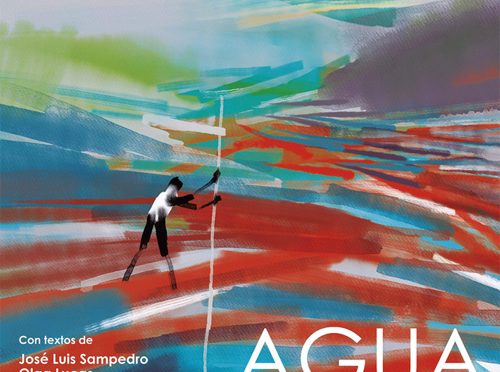Aljibe – Agua, Músicas tradicionales de la Cuenca del Tajo (Aljibe, 2018)
Innovative Spanish folk music band Aljibe has released a new album titled Agua, Músicas tradicionales de la Cuenca del Tajo. The CD comes along with a beautifully-packaged 144-page hard cover book. The set focuses on the traditional folk music of the Tagus (Tajo in Spanish) River basin. The Tagus is the lengthiest river in the Iberian Peninsula.
On Agua, Aljibe delivers lively traditional songs that are recreated using a mix of local and regional instruments together with instruments incorporated from other traditions. The arrangements are respectful to tradition and updated foro modern times.
The album begins with a spoken word introduction by Richard del Olmo based on a text by Góngora, one of Spain’s most famous writers from the late 1500s and early 1600s. The song selection includes: “Mazurca de Albarracin”, a September mazurka “tight dance” from the town of Albarracin in Teruel province; “La peregrina, a pilgrim song from Villaconejos de Trabaque in Cuenca“; and “Mar de Espigas” a harvest song from La Frontera in Cuenca.
Other songs include “Jotas de Guadalajara” from Guadalajara province, the jota is a very popular dance widely extended throughout Spain; “Rogativas de Valdelaguna,” a water prayer from the town of Valdelaguna in the Madrid region; “Gancheros,” a song about the men who transported logs from the Cuenca mountains on the Tagus river to the mills in Aranjuez (Madrid region); “Me ice la gente,” a Sephardic song from Toledo (Spain) and Rhodes (Greece); and “Tickchbila,” a wine test song to demonstrate conversion to Christianity from Toledo and Morocco.
The rest of the album includes “Llámale majo al toro,” a bullfighting and bull run song that combines versions from Lagartera in Toledo province and Candedela and Pedro Bernardo in Avila province; “Quita y pon” from Montehermoso and Plasencia in Cáceres; “Qué linda falúa,” a Portuguese children’s song about the boat men that connected both sides of the Tagus river mouth; and “Barco Negro,” a Brazilian song that became popular in Portugal.
The album ends with spoken word by Mércedes Cepeda who recites a poem by famed writer Garcilaso de la Vega, from the 1500s.
The lineup on the album includes Teresa García Sierra on vocals and violin; Manuel Marcos Bardera on vocals and keyboards; Luis Ramón Martín-Fuentes Palacios on guitar and Spanish lute; Domingo Martínez Martínez on guitars and bouzouki; Luis Miguel Novas Morera on flute and clarinet; Pablo Rodríguez-Tembleco Guilabert on drums; Juan Rodríguez-Tembleco Yepes on vocals and accordion; and José Manuel Rodríguez-Tembleco Yepes on bass and vocals.
The book includes descriptions of the songs, photos of the artists and insightful essays and rare, vintage photos describing the history and wildlife of the region.
Agua, Músicas tradicionales de la Cuenca del Tajo is masterful set that brings together the most beautiful melodies from the Tagus basin along with literature and photography.
Author: Angel Romero
Angel Romero y Ruiz has dedicated his life to musical exploration. His efforts included the creation of two online portals, worldmusiccentral.org and musicasdelmundo.com. In addition, Angel is the co-founder of the Transglobal World Music Chart, a panel of world music DJs and writers that celebrates global sounds. Furthermore, he delved into the record business, producing world music studio albums and compilations. His works have appeared on Alula Records, Ellipsis Arts, Indígena Records and Music of the World.


